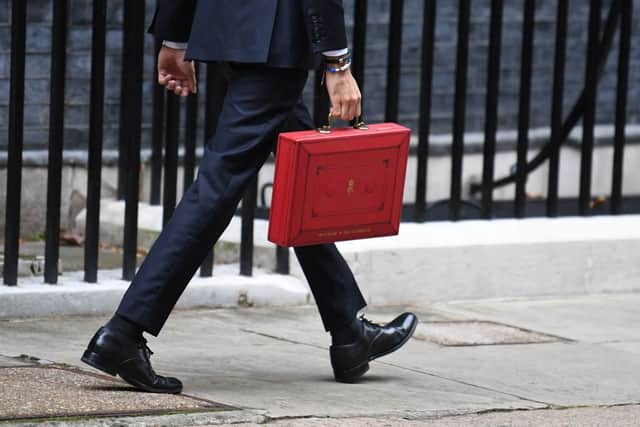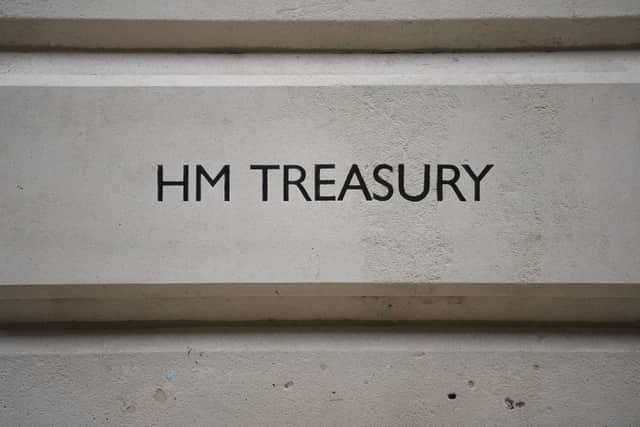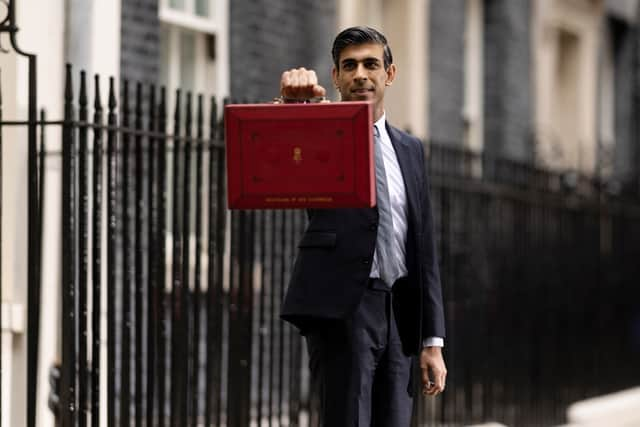What is an emergency Budget? Government process explained 2022, when was the last one, how often are Budgets
and live on Freeview channel 276
There are only four weeks to go until the Conservative Party elects the person who will replace Boris Johnson as the UK’s Prime Minister.
Both Rishi Sunak and Liz Truss have been attempting to woo the Tory party membership with policy announcements and hustings debates.
Advertisement
Hide AdAdvertisement
Hide AdPart of Ms Truss’s proposed economic plan would see her announce an emergency Budget almost as soon as she walks through the door of 10 Downing Street.- something she would use to reverse the previous administration’s National Insurance hike.
It comes after former Labour PM Gordon Brown urged the current PM and the two candidates intending to replace him to agree an emergency Budget or risk seeing the UK enter a “dire” winter hampered by the cost of living crisis - a warning that has been rejected.
So, what exactly is an emergency Budget?


What is a budget?
According to the UK Parliament website, the Budget - sometimes known as a Financial Statement - is a speech given to the House of Commons by the Chancellor of the Exchequer.
It is given because the government needs to convince MPs to approve its spending plans.
Advertisement
Hide AdAdvertisement
Hide AdThe government also has to renew income tax and corporation tax every year, as these are technically temporary.
During a Budget, the Chancellor tells MPs about the state of the nation’s finances and what the government intends to do to taxation.


This event usually takes place twice a year - both in the spring (typically March) and the autumn (either October or November) - although only one of these tends to be considered to be a full Budget, while the other is thought of as more of an update.
Currently, the autumn Budget has been used as the primary UK financial update and fiscal policy announcement.
Advertisement
Hide AdAdvertisement
Hide AdAlongside the Chancellor’s speech, economic forecasts are released by independent public body the Office for Budget Responsibility (OBR).
The OBR was set up by the coalition government in 2010 to assess how policies could affect the economy and to provide public assessments of the government’s performance against its fiscal targets.
What is the Budget process?
After the Budget has been given, the Opposition gets to provide a response to the measures that have been announced.
Four days of debate then tend to take place as the House of Commons must decide whether or not to pass the legislation announced in the Budget - i.e. the Finance Bill - into law.
Advertisement
Hide AdAdvertisement
Hide AdThe House of Lords also gets to look at the Bill but has limited powers to amend it.
It then reaches the Commons Treasury Select Committee - a cross-party group of MPs - which scrutinises what’s been announced.
Usually the Budget gets passed as the governing party will have a majority of MPs.
But if it isn’t passed, it’s considered to be a vote of no confidence in the government as it will not have permission to raise vital taxes to keep the state running.
Advertisement
Hide AdAdvertisement
Hide AdTo avoid this scenario, governments can hold back unpopular announcements from the initial Finance Bill and bring them to Parliament at a later date.
What is an emergency Budget?
While the Budget is relatively set in stone in the Parliamentary calendar (the exact dates are unknown but the events tend to take place at a similar time every year), emergency Budgets are much looser affairs.
They are typically introduced to combat a particular issue that poses a threat to the UK’s economy.
Since the Covid pandemic in 2020, Rishi Sunak has technically called four emergency Budgets - although the government did not label them in this way.
Advertisement
Hide AdAdvertisement
Hide AdThey could be considered to be emergency Budgets as they involved major spending pledges that would require adjustments to taxation.
His first, delivered in March 2020 - just days after he had delivered a full spring Budget - announced measures aimed at protecting the UK economy as the Covid pandemic began to hit the country.
It included the announcement of furlough and other fiscal support measures, and came just days before the UK went into a national lockdown.


In July 2020, Mr Sunak provided another financial update.
These fiscal statements could not be delivered to the House of Commons (as is customary) because of the virus.
Advertisement
Hide AdAdvertisement
Hide AdIn 2022, Mr Sunak arguably gave two emergency Budgets - one in February to introduce a package of cost of living support, and another in May to increase that support and introduce a windfall tax on energy firms.
The previous emergency Budget was called in the wake of the 2010 General Election.
Given the UK has an unwritten constitution, there is no strict protocol for how a government can call an emergency Budget.
Since the introduction of the OBR, they have typically been announced 10 weeks in advance to allow the organisation time to develop a forecast.
Advertisement
Hide AdAdvertisement
Hide AdBut they do not have to give such notice, as the OBR forecast is not a requirement - although proceeding without it could dent the government’s credibility.
The government also does not have to give such a Budget in Parliament.
But to do so would be viewed as anti-democratic given it would take away MPs’ chance to scrutinise legislation properly.
Comment Guidelines
National World encourages reader discussion on our stories. User feedback, insights and back-and-forth exchanges add a rich layer of context to reporting. Please review our Community Guidelines before commenting.
